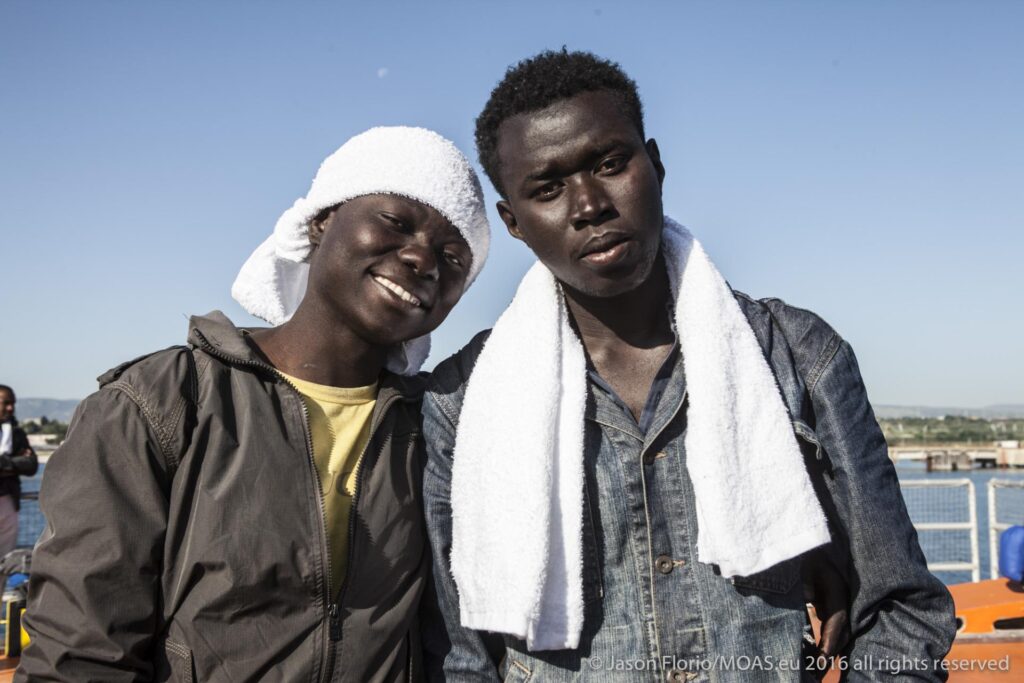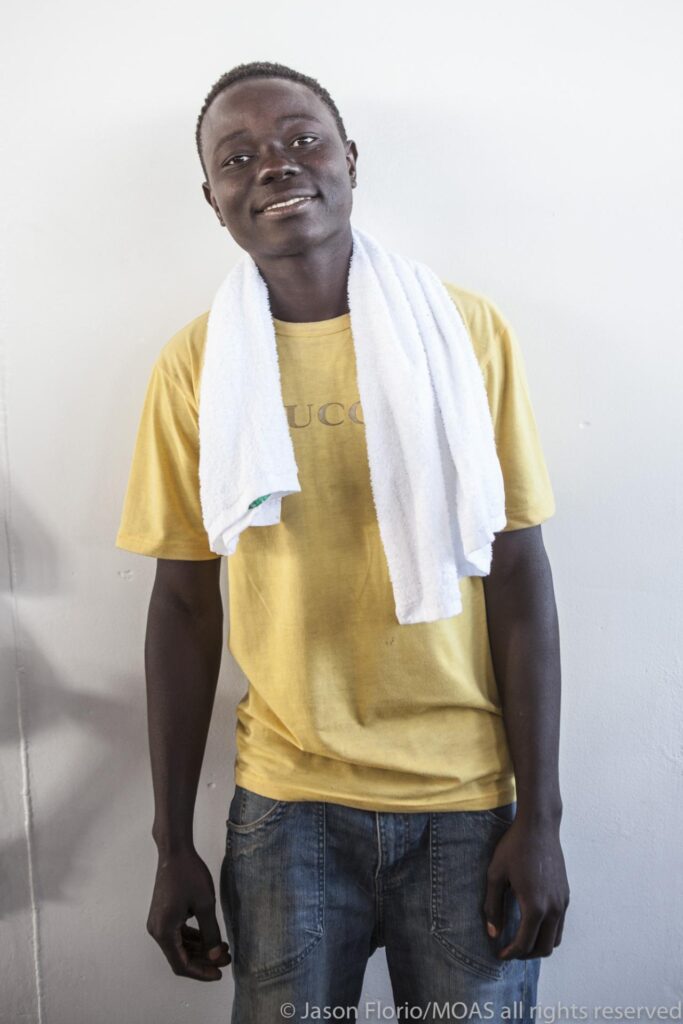MOAS is lucky to have a team of professional photographers who do the important job of documenting our missions. Often, they have lived and worked all over the world. Here, Jason Florio, one of our photographers shares the memory of a chance meeting, one which demonstrates how small our world can be.
The smile seemed distantly familiar, but in the fray of the rescue it was just another face thankful for the arrival of the MOAS team. We had come to the aid of a desperately over-crowded wooden boat in danger of sinking, and as the team evacuated the men, women, and children, I focused on what I was there to do: taking photographs and video in an attempt to show the world the desperate lengths people take to flee conflict, persecution, and grinding poverty.
After about three hours, everyone was safely onboard the Phoenix and being tended to by the post-rescue team. The people were physically and mentally exhausted, not just from the 12-hour ordeal at sea, but by the many months, sometimes years, spent on journeys during which most had suffered or witnessed terrible abuses. Most were now fast asleep under blankets, comfortable in the knowledge they were safe.

Between the sleepers, some teenage boys from West Africa were quietly chatting together. I asked them if they understood Mandinka, one of the main languages in The Gambia.
“Ha!” Yes! said a boy in a yellow football jersey.
“Abinyadi?” How are you? I said.
“Abijang!” I am here, his face opening in an incredulous smile.
Seeing his confusion, I explained that I live in Gambia. The boys all started laughing.
“E todu?” What’s your name? I asked.
“Alasan, from Kubeneh village”. The world suddenly began to seem a very small place.
“Kubeneh is my adopted home village! Do you know Musa?”
“The fisherman? He is my neighbour!” Alasan replied.

We started chatting intensely, sharing our Gambian commonalities and love of the country. I had been working on projects in The Gambia since 1998, many with Musa the fisherman at my side. Although I did not know him, it is quite possible I had passed Alasan on my many visits to Musa’s home.
Our common bond of his country and culture could only lead me to feel deep compassion for Alasan. What was I doing at seventeen? Living in the leafy suburbs of London, working on my A-levels, with only my passion for skateboarding to worry about.
He told me he when he was around fifteen, he knew he must take the ‘koma sillo’, the back-way, as Gambians colloquially call the route to Europe, because of the extremely challenging political and economic climate in his country. He left school early to make money for his family, training and working as a tailor, and saved enough to start his long journey. When he was sixteen, he travelled to neighbouring Mali. It took him a further four months to travel through Burkina Faso and Niger before finally reaching Libya.
“I was in Libya for ten months, and was taken to jail three times. I do not understand the Libyan smugglers; they would beat and abuse us for no reason. We worked for them and they would steal our money. I have seen such bad things you cannot imagine”.
I asked him about his family. “My mother died and we are a small family. My dad works at a place called Mandina near Kubeneh; maybe you know it?”
“Your dad works at Mandina?!”
Mandina was the reason I first went to The Gambia, and where I met my wife Helen a year later. One of my skateboarding friends had moved to The Gambia in 1997 to build an ecolodge named Mandina, inviting me to document the project and people who lived in and around the forest. Helen and I became more and more fascinated with the country and returned yearly to photograph and film, resulting in us relocating there full-time in 2013.
“Yes, my dad works as the store manager at Mandina”. Amazed, I began to realise why Alasan had seemed so familiar to me.
“I know your father – he is called Omar! A Jola man with two small traditional scars on each cheek and the same huge smile as you. I even photographed him for a project about the forest.”
“Yes, that is my dad!”.
A surge of emotion rushed through me. We hugged and laughed at the seeming impossibility that we could meet in the middle of the Mediterranean. He explained that he had last been able to contact his family four months ago, just before the smugglers had detained him for the final time.
“They have no idea if I am alive or dead” he said solemnly. “I am the eldest son, they will be very worried”.
Back in the MOAS crew lounge, I hurriedly called Helen, who was still in The Gambia. “Call Omar at Mandina!” I shouted over the distorted Skype line. “You won’t believe it! Tell him I am with his son. The rescue team pulled him from a sinking boat!”
As a photojournalist I try to remain neutral and somewhat detached from the subject matter. Yet sometimes the story pulls you in so personally, so deeply, that you can’t easily walk away from it. A year and half later I am still embedded with the MOAS team and still meeting Gambians at sea who I am one only degree separated from. Helen still makes the calls back to the families in Gambia. This time, for us, the story is personal.
If you have a question for our team, simply #AskMOAS on social media. For all the MOAS news and updates sign up to our newsletter at the bottom of this page. Finally, support our rescue missions by giving whatever you can to help us save lives at sea.
